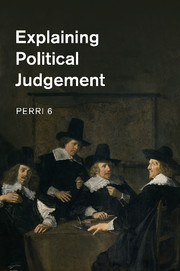Book contents
- Frontmatter
- Contents
- Figures
- Tables
- Acknowledgements
- Epigraph
- Chapter 1 On political judgement
- Chapter 2 The need for richer explanation
- Chapter 3 A Durkheimian theoretical framework
- Chapter 4 October 1962, before and after
- Chapter 5 The Khrushchev régime
- Chapter 6 The Kennedy administration
- Chapter 7 The Castro revolutionary régime
- Chapter 8 Implications
- Chapter 9 Coda
- Notes
- References
- Index
Chapter 7 - The Castro revolutionary régime
Published online by Cambridge University Press: 07 October 2011
- Frontmatter
- Contents
- Figures
- Tables
- Acknowledgements
- Epigraph
- Chapter 1 On political judgement
- Chapter 2 The need for richer explanation
- Chapter 3 A Durkheimian theoretical framework
- Chapter 4 October 1962, before and after
- Chapter 5 The Khrushchev régime
- Chapter 6 The Kennedy administration
- Chapter 7 The Castro revolutionary régime
- Chapter 8 Implications
- Chapter 9 Coda
- Notes
- References
- Index
Summary
Recent work on the missile crisis has emphasised that it was much more than a superpower conflict which happened to be fought around a particular locale. The Cuban revolutionary régime must be recognised as an active participant in its own right, exercising its own distinctive style of political judgement (Blight et al., 2002 [1993], e.g. 5; Brenner, 1990; Laffey and Weldes, 2008), despite its limited role in crisis week diplomacy (Domínguez, 2000). Indeed, one of Castro's and his colleagues' principal resentments against Khrushchev after the immediate threat of general war receded was precisely that he felt that Cuba had been treated as merely a venue. Some commentators regard the superpowers' tendencies to treat developing countries in this way during major conflicts as itself a source of instability and risk, over and above those risks presented by the particular strategies adopted (Belkin and Blight, 1991).
The Castro revolutionary government's style of political judgement was exercised most obviously in three clusters of decisions. In the months before the crisis, Castro and his fellow leaders decided to accept Soviet medium- and intermediate-range nuclear missiles. In September, that acceptance was modified by the decision to send Che Guevara and Emilio Aragonés Navarro to ask Khrushchev to consider making the nuclear deployment public. In October 1962, the Cuban leadership adopted a strategy of extreme confrontation of the USA. Mass mobilisation of civilians was introduced; apparently it was widely and willingly followed. Castro's letter to Khrushchev suggested a readiness personally and on the part of many Cubans to die in battle, resisting the expected US invasion. Most remarkably, it appeared to ask the Soviet leader to launch a first-strike nuclear attack on the mainland USA, should the invasion forces be launched. He authorised firing on US planes, surely knowing the likely consequences. After Khrushchev accepted Kennedy's terms and announced the withdrawal of the missiles, Castro set his government on a course of bitter obstruction of the deal. He reproached Khrushchev in particular and the Soviet politicians in Moscow (but not the Soviet military in Cuba) with betrayal and selfish manipulation of Cuba. He also sought – in the event, unsuccessfully – to impose conditions for the withdrawal upon the USA, the Soviet Union and even the UN. Nevertheless, by then dependent economically, in conventional military materiel and for know-how upon the Soviet Union, Castro was careful not to push Khrushchev to a complete break. Nor did the Cuban leader, for example, at this stage seek the patronage of Mao's China (although he did briefly explore the possibility some years later, only to be rebuffed).
- Type
- Chapter
- Information
- Explaining Political Judgement , pp. 245 - 270Publisher: Cambridge University PressPrint publication year: 2011



